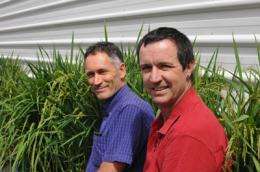New rice research sows seeds for growing success

(PhysOrg.com) -- With rice production in Australia plummeting and extreme weather events becoming more frequent, researchers at Macquarie University are working towards developing simple tests that could help growers better assess the health of their plants and more easily predict crop yields.
Biomolecular chemist Associate Professor Paul Haynes and plant biologist Associate Professor Brian Atwell are collaborating on the project, and say analysing the proteins found in the leaves of rice plants and how they respond to extreme temperatures may hold the key to predicting a plant's success early on in the crop cycle.
"The problem we have in Australia is that in the past the Australian rice industry has grown some of the highest yielding plants in the world, but in the last ten years climatic extremes and water shortages have drastically reduced production," Haynes said.
"Exposure to cold temperatures even in short bursts can render a rice plant sterile, which greatly reduces the yield of seed. The tricky thing about that though is that often a sterile plant will still look healthy and normal - it's not until it comes time for the harvest that a grower discovers he has a much lower yield than expected."
Haynes and his team began by exposing cultured rice plant cells to temperature shocks ranging from 12 to 44 degrees celsius. They then looked at the proteins inside the cell and how they changed as a result of that exposure. They are now carrying out the same process using young plants.
"By looking at the molecular level, we can identify biomarkers of cold stress and heat stress and then hopefully create a diagnostic test that will tell a grower if their plants have been damaged and won't produce enough seed," Haynes said.
"Rice is notoriously sensitive to the cold, but our hope is that in the future we may get to the stage where we can select rice varieties for the presence or absence of a specific protein or group of proteins, and use this to develop rice plants which are cold resistant."
Haynes hopes the research may go some way to addressing the rice shortage globally.
"We're facing a big shortage in the future, so we don't just have to keep up with rice production, we have to improve it a lot," he said. "And that's what's scary about it, because at the moment we are not keeping up."
Provided by Macquarie University

















